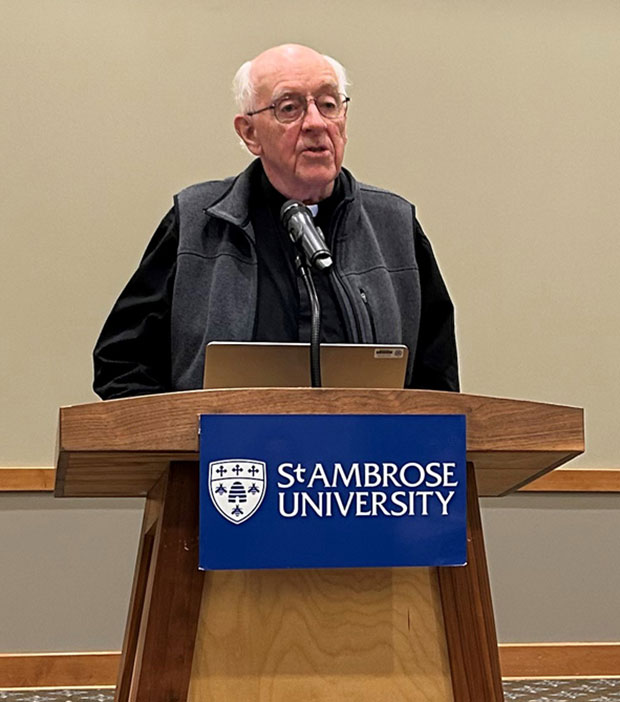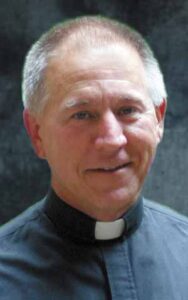
Father Allan Fitzgerald, O.S.A., speaks on St. Ambrose during a talk earlier this month in Davenport.
By Barb Arland-Fye
The Catholic Messenger
Clashes between church and state are as much a reality today as they were in 4th century Milan, when St. Ambrose leaned into the Word of God to avert crises and to guide the faithful to trust God. Father Allan Fitzgerald, O.S.A., unpacked the 4th-century drama during a talk at St. Ambrose University in Davenport earlier this month to show his audience the way forward in challenging times.
This was the situation: Roman Emperor Valentinian II, a teenage ruler, attempted to take over a basilica at Easter in 385 and 386 for a gathering of Arians of Milan. The emperor’s mother, Justina, likely persuaded her 15-year-old son to do so. The Arians did not believe in the divinity of Christ, which left Father Fitzgerald wondering why they wanted to use the basilica.
For standing in solidarity with their bishop, the faithful endured penalties and persecution, he wrote in a letter to his sister, Marcellina. After meeting with court officials who urged him to give up the basilica, St. Ambrose said he responded “… I will not lay hold the Altar and beg for my life; rather will I offer myself to death for the Altar.”
The bishop could not go home because soldiers surrounded the church. He recited psalms with the faithful in the church’s basilica minor and spent the beginning of the conflict “with his people, talking about Job during the day and spending the night praying the psalms of David,” Father Fitzgerald said. These two biblical figures experienced tremendous trials that tested, but ultimately strengthened their trust in God’s justice.
St. Ambrose’s use of the words and examples of Job and David, added “much to the efforts of the surrounding culture to understand the human condition and God’s justice. It can do the same for readers today,” Father Fitzgerald, an Augustinian priest, writer and professor at Villanova University told his audience.
A couple of years later, St. Ambrose published his work, “On the Appeal of Job and David,” which “seems to me to have a special connection to that crisis,” the theologian said. “It would have been the basis for asking Job and David to let him bring their words together in an appeal before God and for his people.”
In “‘The Appeal of Job and David,’ Ambrose shows that he wants his people to appreciate how God was at work in their everyday lives — even if he may have seemed to be abiding his time or even absent,” Father Fitzgerald said. “The experiences of Job and David are meant to inspire others to hear the biblical experience as a challenge to the cultural or philosophical thinking of that time. What is and what is not important in the process of trying to live according to the Christian faith.”
Job “does not shy away from or complain about his misery but faces it as a challenge…. Job is adamant that his conscience is clear and that the challenges he faces simply call him to believe more deeply and to accept it all as part of a larger plan,” Father Fitzgerald said.
St. Ambrose bases David’s appeal primarily on psalms 42 and 73. The overall emphasis, Father Fitzgerald said, “is on the confidence that everyone should have in placing their own pleas before God.” St. Ambrose recognized that “David found strength in affliction, and his experience shows that God’s plan is for everyone — even those who do not yet believe.”
Father Fitzgerald observes, “Where Job had dealt with the human condition and continued to lament even as he affirmed God’s judgment, David leads the community to Christ, to the altar of God with the melody of good works. Job heals the flesh; David reaches to the soul.”
Using the examples of Job and David to reflect on the travails of the basilica, St. Ambrose “invites his people to appreciate the divine wisdom of God,” Father Fitzgerald said. “The path for holiness for (Ambrose of Milan) was centered on the unity of the community — whether caught up in earthly disorders or dealing with a greedy emperor.”
Father Fitzgerald’s scholarship on this topic breaks new ground, says Father Bud Grant, an SAU theology professor who co-directs the Academy for the Study of St. Ambrose of Milan with Ethan Gannaway, also an SAU professor. “It is almost impossible to imagine that there are any new insights to be gleaned from texts that we’ve had for 1,600 years. Father Fitzgerald is offering us a new insight that no one has investigated before. Those who were in that audience (April 3) were experiencing a new page being written in the academic and pastoral theology of Ambrose of Milan.”

“Combined, Job and David make the same appeal to God: why is there injustice?” Father Grant told The Catholic Messenger after the talk. “The answer David receives is about our purpose, our focus on eternal life (the altar, in Father Fitzgerald’s interpretation). The answer Job receives is about meaning: continue to do what is righteous, regardless of the turmoil around us.”











